At some time in your life there’s a very real possibility that you’re going to be called on to be someone’s caregiver. One of the biggest challenges that any caregiver faces is knowing where to turn and what resources are available to help them navigate the journey.
One day at a time. That’s how most caregivers look at life.
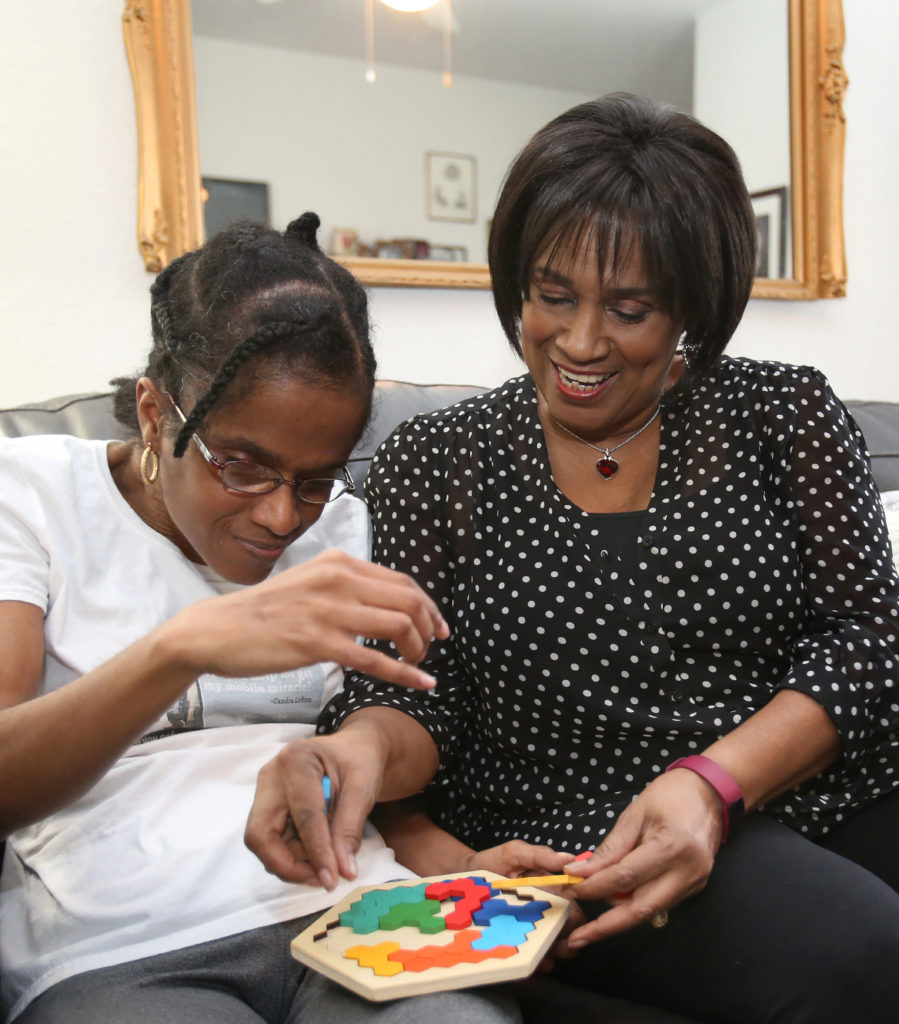 But, for Linda Lofton, one day at a time has turned into more than 40 years of caregiving for her daughter Candra, who was diagnosed with hydrocephalus shortly after birth. Candra suffered numerous complications during her first year of life. For a while she could walk without assistance and she even ran in Special Olympics races, but, in recent years, Candra’s left leg and arm began to atrophy and she became dependent on a wheelchair.
But, for Linda Lofton, one day at a time has turned into more than 40 years of caregiving for her daughter Candra, who was diagnosed with hydrocephalus shortly after birth. Candra suffered numerous complications during her first year of life. For a while she could walk without assistance and she even ran in Special Olympics races, but, in recent years, Candra’s left leg and arm began to atrophy and she became dependent on a wheelchair.
After graduating from Hillcrest School, Candra waited nine years for Medicaid Waiver services so she could attend adult day training at ARC Marion, the Advocacy Resource Center.
In the meantime, the majority of Candra’s care has fallen on Lofton, a single mom, who left her job as a makeup consultant in order to stay at home with her daughter.
“There are lots of positives about Miss Candra,” Lofton says softly. “She loves to smile. And she’ll do funny little things that make you know she is not a baby. She likes to think for herself. When she looks at me and smiles, which is all the time, it makes me smile.
“But you just never have a life,” sighs Lofton. “It’s having to take care of another woman, basically. When you don’t have that extra person to lean on, it’s rough. I’ve got back problems from lifting Candra’s wheelchair in and out of the trunk of my car. I go to a chiropractor, I do exercises and I try to deal with it. I’m just needing a break while knowing she’s taken care of.”
Lofton’s other daughter, Leah Taylor, helps whenever she can, but most of the caregiving falls on Lofton.
“I try not to put too much on Leah, but it’s just a help having somebody else around so I can run out to the store,” Lofton says in praise of her elder daughter.
To help them cope, both Lofton and Taylor recently enrolled in Savvy Caregiver classes offered by Elder Options in Gainesville. The seven-week course, which was actually designed for people who assist someone living with dementia, also provided vital information about self-care and stress reduction, which Lofton shares with members of her caregiver support group, Shining Lights. She helped start the program two years ago at Meadowbrook Church.
“I’ve had a good ministry over me,” Lofton shares. “My belief in the Lord is that He just takes care of us. My saving grace has been ‘one day at a time.’”
Most mornings, while Lofton is getting Candra dressed and putting toothpaste on her toothbrush, in another part of town Judy Berthelot is helping her husband Elmo shower and shave. Over the next several hours, both women will be cooking meals, walking their “patients” to the bathroom, and finding ways to keep them entertained.
It’s like taking care of a child, notes Berthelot, who has watched her husband decline with Alzheimer’s disease for the last 22 years of their 29-year marriage.
“The difficult part was in the beginning when the unknown factors were throwing out their ugly faces,” recalls Berthelot. “I just sensed a difference in him, but I didn’t understand what it was. It just wasn’t him. He had a problem trying to retain a focus. Conversations were difficult, because his comprehension was being lost at the same time. We got bombarded with difficult social situations. If we were in a group of people and we were talking, he didn’t respond because he couldn’t keep up with the conversation.”
Sometimes the former Elmo reappears for a little while. Somebody plays a song at a clubhouse gathering and, although Elmo can no longer dance, his face lights up and he gets into the rhythm, says Judy.
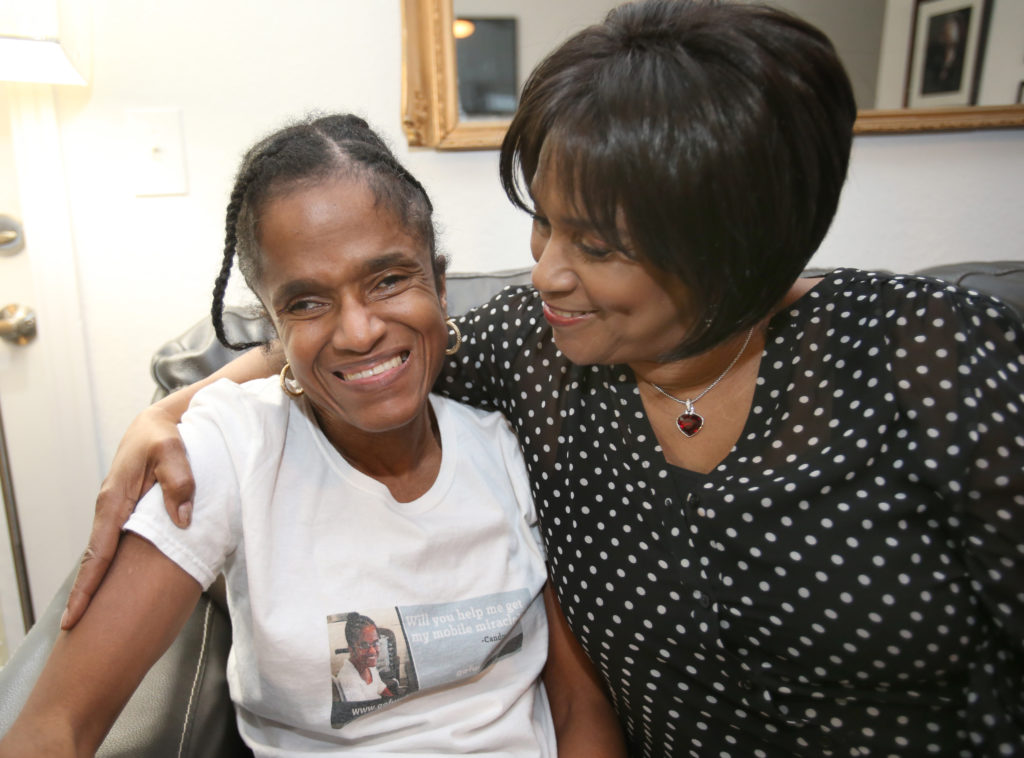 “Dancing is something that was built in—the beat, the rhythm was always inside of him,” she recalls with a giggle. “Even today, if he can’t dance, he can tap his cane to the music. In Blessed Trinity (Adult Day Care), sometimes they have guests who come in and play music, and sometimes they’re songs he remembers and there goes the cane. He’s reliving that happier time when he could jump up and have fun.”
“Dancing is something that was built in—the beat, the rhythm was always inside of him,” she recalls with a giggle. “Even today, if he can’t dance, he can tap his cane to the music. In Blessed Trinity (Adult Day Care), sometimes they have guests who come in and play music, and sometimes they’re songs he remembers and there goes the cane. He’s reliving that happier time when he could jump up and have fun.”
Such stirrings of life give a moment of joy to the Berthelots. Then, Judy laments, reality sets in and they are back to a parent-child relationship.
“Number one, you have to understand the person and where they are in this disease and that it is a disease,” advises Berthelot. “This is not the person who is lashing out at you, the person that you’re waiting to say, ‘I love you,’ and put his arm around you, because that may never happen again.”
Fortunately, Berthelot had the foresight to purchase a long-term care insurance policy which has paid for home health care with a certified nursing assistant (CNA) and also is funding Elmo’s adult daycare at Blessed Trinity. More recently, Berthelot applied for additional resources through Caregiver Services Inc, a Miami-based home care provider.
According to the organization’s website, without long-term care insurance, the average monthly cost of services would be $3,833 in Marion County. For Berthelot, the insurance has been a lifesaver.
Nevertheless, caregiving is not an easy task for this 112-pound woman who’s taking care of a 207-pound man.
“If I have to move him, shift him or roll him in the bed, or try to lift him, I couldn’t do that,” admits Berthelot. “As long as he’s walking on his own two feet, we’re good.”
Help Is Available
Lofton and Berthelot are part of a growing number of caregivers in the United States. According to a 2017 AARP report, 41 million family caregivers provided 34 billion hours of care in the U.S., generating an estimated economic value of $470 billion. Listed among the most prevalent medical duties caregivers undertake are pain management, wound care, giving injections and operating medical equipment. Add to that transportation, meals, taking care of insurance and finances, and assisting a loved one with bathing, dressing, grooming and other daily needs, and the caregiver is set up for burnout and even health problems of their own.
But help is available, explains Beverly Crumpler, program manager of Hospice of Marion County’s Transitions, one of three Transitions programs in Florida, the other two being Big Bend Hospice in Tallahassee and Haven Hospice in Gainesville. Transitions is a support system for those challenged by an advancing, life-limiting illness.
No stranger to the plight of a caregiver, Crumpler is currently taking care of two people: her 81-year-old mother, who has rheumatoid arthritis, and her son, Dexter, who is 31 and was diagnosed with autism. Spurred by her personal experience, Crumpler has been working with Hospice of Marion County for 16 years. She became manager of Transitions three years ago. Applying for services is easy. Just pick up the phone, says Crumpler.
“The first phone call usually comes from the doctor’s office, a family member or even the patient themselves,” Crumpler explains. “We send a caseworker out to assess the situation. We have a wealth of resources for them. We partner with a lot of local organizations to meet the needs of patients. When we notice a client is having issues or declining, we’ll communicate that with their physician. It’s all about gathering the best resources to meet the needs of that patient so they can live as normal as possible.”
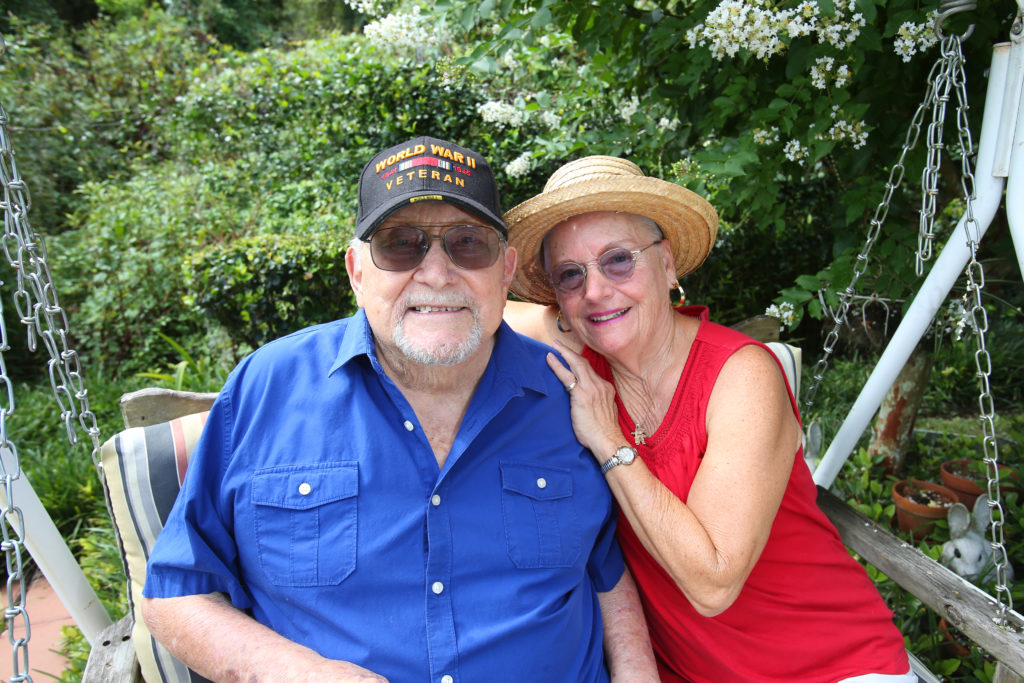 The Transitions staff and volunteers also pay close attention to the needs of the caregiver, Crumpler adds.
The Transitions staff and volunteers also pay close attention to the needs of the caregiver, Crumpler adds.
“When you’re caring for someone you sometimes forget to care for yourself,” she says, partly from experience. “We not only look for resources for the patient but we’re also looking for resources to help the caregiver. When a caregiver starts to get burnout, we notice their own health starts declining. That’s a big one for us. If anything happens to that caregiver then who is gonna care for that patient?”
There are telltale signs to look for when a caregiver is heading for burnout, says Crumpler.
“One of the big things they start going through is depression. A lot of them are not able to get enough sleep. They’re fatigued. Then if they should have any health problems themselves, they start showing more and more symptoms.”
Crumpler recommends having someone else come in and sit with the patient so the caregiver can get a few hours of respite.
“It’s okay to take a break,” insists Crumpler. “They need to get away so they can revive themselves. Just go to the golf course and play a round of golf or just go shopping without having to look at your watch and rush back home. Then roll up your sleeves and go back at it.”
Caregivers also need to put a long-range plan in place, insists Crumpler.
“Unfortunately, a lot of caregivers don’t have plans,” she admits. “We have a large population that come down here to retire. Suppose one of the two gets sick and the children are up north working? This is a retirement state. All of us are gonna be caregivers at some point. It’s not if, it’s when.”
Transitions of Marion County has three caregiver support groups that meet monthly. One is located at the Elliott Center in Ocala, one at Brandley House north of The Villages, and the third is for the residents at Ocala Palms and was started in January 2019 by John Renyhart, who leads the group.
Renyhart knows what it’s like to have his world turned upside down. He and his wife, Nancy, had a wonderful life together, traveling and visiting with family and friends. Then Nancy started to experience short-term memory loss and she began to withdraw from social activities. She was diagnosed with Alzheimer’s disease in 2011. After 56 years of marriage, Renyhart’s life partner died on April 30th this year.
“I miss her dearly,” laments Renyhart. “I will tell you that the struggle she had with this, especially over the last few years, it was difficult to see her go down. Swallowing for example—that was one of her biggest issues. We tried all kinds of things to keep it under control, but eventually it just got the best of her. Whenever I had a moment of utter despair, I always thought, where are we going? My job was to keep her home. We did everything we could possibly do to keep her comfortable and safe and keep her alive.
“When people witness what is happening to their loved ones it’s tough to watch,” he adds, after an emotional pause. “Sometimes at our age, there is a certain amount of memory loss. It’s part of the aging process. But for someone who has dementia it’s far more serious. It isn’t just forgetting where they put the keys. Nancy went out in the car and she got lost, so we surrendered her driver’s license and got a state identification.”
Like Lofton, Renyhart furthered his own education in 2015 when he enrolled in the seven-week Savvy Caregiver training program.
“It was a godsend,” declares Renyhart. “It was just before Nancy’s health really took a nosedive. It helped me understand the different stages of the disease, the type of behavior to anticipate and the best ways to respond. It’s being proactive in dealing with this disease.”
Renee Horne, one of the facilitators of the Savvy Caregiver’s classes, makes sure people know what to expect when they take on the role of a caregiver. Discussions often focus on the types of behavior Alzheimer’s patients might display, such as outbursts or wanting to wander back to the home they grew up in. While dealing with such unnatural behaviors, the caregiver needs to separate enough to take care of themselves, Horne advises.
“We stress self-care because we don’t want to lose two people to the disease,” explains Horne. “Caregiving is a different role than the role you had with the person before, and you have to learn the skills to take on that role. It’s about not being isolated. Too often caregivers think they’re alone. They don’t realize there are other people out there.”
A 2020 report by the Alzheimer’s Association mentions that more than 5 million Americans age 65 and up have Alzheimer’s disease. Medicare and Medicaid will cover $206 billion, or 67 percent, of total health care and long-term care payments for people with all types of dementias. Out-of-pocket spending will likely reach $66 billion this year, the report states.
While learning how to deal with Nancy’s disease, Renyhart said he also learned a lot about himself.
“The very first thing I learned was that I am not a very patient person in my workaday life,” he admits. “When Nancy took ill and the disease progressed it became evident that patience was really important. It requires an inordinate amount of patience and understanding.”
For a while Renyhart was able to get a daily break by placing Nancy in Blessed Trinity’s adult daycare, but he had to pull her out when she started having trouble swallowing. Then, using his long-term care insurance, he hired a home health aide to come to the house seven days a week.
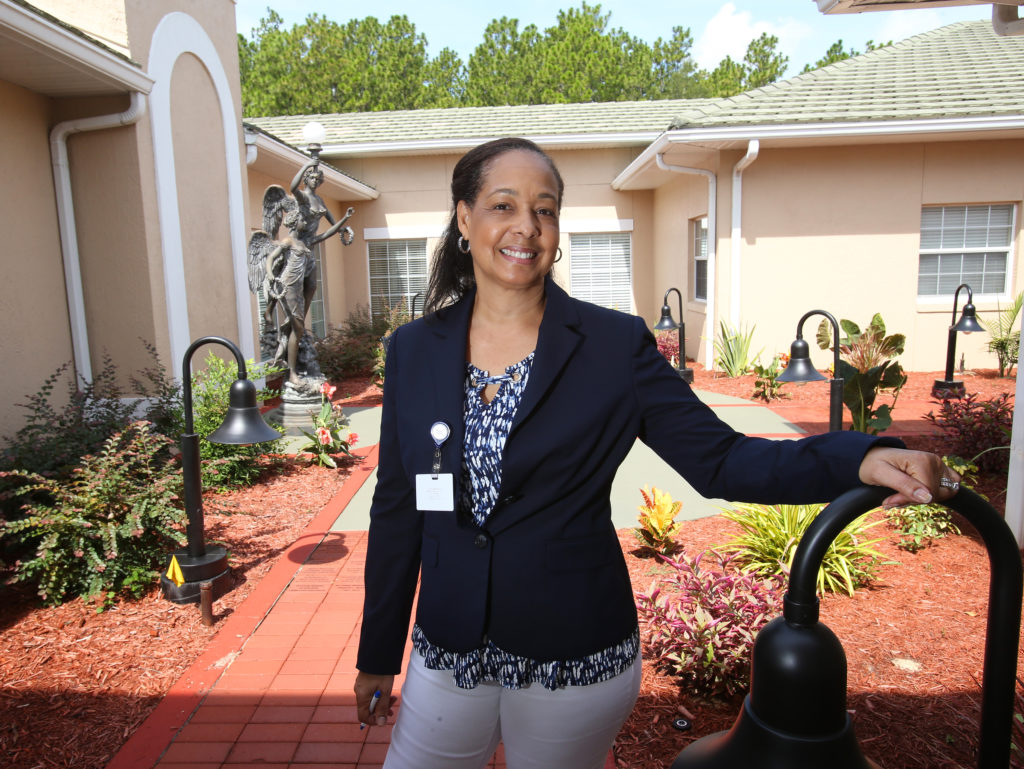 “One of the things that every caregiver needs is respite,” acknowledges Renyhart. “You need to have some kind of break. Having someone come to the house gave me the opportunity to go to the store or get a haircut or just go to a meeting. Someone who is in the full throws of being a caregiver, totally immersed, they need a break. Caregiving is stressful. It can be very challenging and emotionally and physically stressful. Sometimes you don’t sleep well. When you’re in the role of a caregiver, you need to take care of yourself.”
“One of the things that every caregiver needs is respite,” acknowledges Renyhart. “You need to have some kind of break. Having someone come to the house gave me the opportunity to go to the store or get a haircut or just go to a meeting. Someone who is in the full throws of being a caregiver, totally immersed, they need a break. Caregiving is stressful. It can be very challenging and emotionally and physically stressful. Sometimes you don’t sleep well. When you’re in the role of a caregiver, you need to take care of yourself.”
To help nurses and other medical personnel understand their patients who have Alzheimer’s and other types of dementia, Renyhart recently established the Nancy Renyhart Endowment for Dementia Education, a part of the philanthropic mission of Hospice of Marion County. And, though his caregiving days are over, Renyhart continues to lead the Ocala Palms support group meetings.
“Part of my therapy is helping other people get through this,” muses Renyhart. “There isn’t a week goes by that we’re not helping someone in a more intimate fashion. One of the challenges that any caregiver has is knowing where to turn, where the resources are in the community that can help them navigate this journey. A lot of people who find themselves in the role of a caregiver may lack confidence. They may feel overwhelmed. We feel as a support group that we can help.”
Today’s Caregiver Magazine has named Ocala Palms Caregiver Support Group as one of the recipients in their nationwide 2020 Caregiver Friendly Award in the Service category, recognizing their support of family caregivers while also improving their loved ones’ quality of life.
Needless to say, there are rewards, some hidden and some that surface unexpectedly, reflects Renyhart. He especially likes to talk about the time a physical therapist was helping Nancy walk using a gait belt.
“Overnight she had just stopped walking,” Renyhart recalls. “It was just remarkable to see how the therapist was getting her to walk. She really wanted to walk. She kept moving her feet, and there were moments when she smiled.”
Then there were those fleeting times when Nancy connected with him on a personal level.
“Oftentimes when I would tell her I loved her, she didn’t say it back. She couldn’t communicate that way,” recalls Renyhart. “It was through facial expressions, a smile. And a couple of times when I was holding her hand I felt a slight squeeze. She was getting it. I never gave up on her no matter what. As trite as this sounds, I always took my marriage vows quite literally—for richer, for poorer, in sickness and in health—that was always on my mind.”
You Are Not Alone
The Family Caregiver Alliance website notes that 85 percent of all caregiving typically falls to a family member. But they don’t have to make the journey alone. Multiple organizations offer resources that benefit the patients and also reduce the stress on family members who care for them.
Among Marion County’s “knights in shining armor,” Marion Senior Services (MSS) offers numerous resources that help both the client and the caregiver. Due to the recent pandemic, companion and respite services have been suspended, however volunteers do telephone reassurance calls and deliver meals on wheels, notes Jennifer Martinez, MSS executive director. Once things get back to normal, the respite services will once again provide a needed break for the caregiver, Martinez assures.
“A lot of our dementia clients’ caregivers don’t get time for themselves to recharge their batteries,” admits Martinez. “We try to give them as much support as possible. It’s important for them to take care of themselves in order to take care of their loved ones.”
Also coming to the rescue, Ocala Caregivers provides a variety of services and works alongside skilled nursing care, says director Sam Betty.
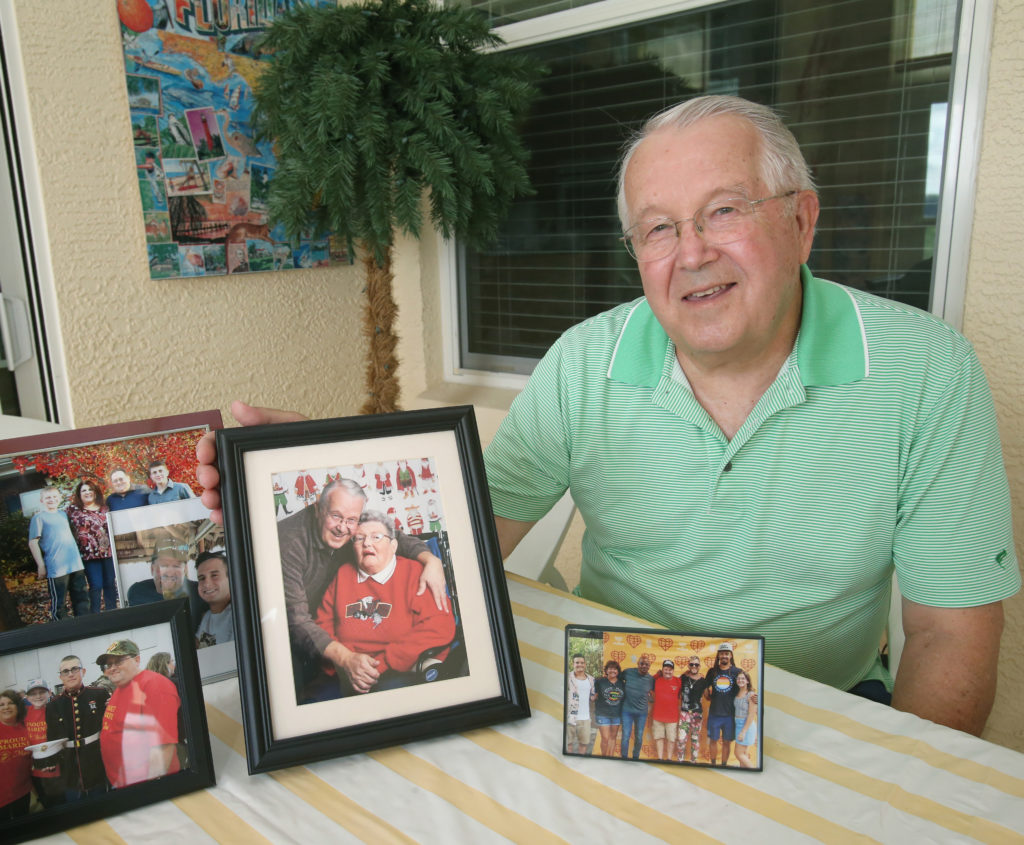 The organization charges a flat rate of $15 per hour for a minimum of four hours up to 24 hours a day, seven days a week, states Betty. Some private insurance, such as long-term care insurance policies, cover the cost, and Medicare will cover it under a limited timeframe when a doctor prescribes it after hospitalization, Betty explains.
The organization charges a flat rate of $15 per hour for a minimum of four hours up to 24 hours a day, seven days a week, states Betty. Some private insurance, such as long-term care insurance policies, cover the cost, and Medicare will cover it under a limited timeframe when a doctor prescribes it after hospitalization, Betty explains.
“Most of the time we’re assisting the spouse or family member that lives in the home and is acting as the caregiver,” maintains Betty. “We also have resources on our website for dementia and caring for elderly family members. We have a lot of dementia patients, people going through cancer therapies, individuals who are getting to the point in age where they need a hand around the house or they aren’t driving anymore.”
Sometimes, the disabled person is younger and active enough to receive services outside the home. For them, there is ARC Marion, a Medicaid Waiver-funded adult day training center, and also the Transitions Life Center (TLC), a nonprofit, faith-based community for intellectually disabled individuals.
Lucy Johnson, executive director of TLC, praises the organization as a safe place with a variety of learning activities, such as arts and crafts, life skills, and physical fitness.
“They want their own independence, just like each of us who want to go and have a job and have a little bit of peace for ourselves,” contends Johnson.
The daily fee is $40, however, Johnson says, many of the clients have accessed funds through the state’s Consumer-Directed Care Plus, an alternative to Medicaid Home and Community Based Services. Also, financial assistance can be awarded in-house on a sliding scale, Johnson mentions.
Of all the family members Johnson has met over the years, she remembers well the one who confided how exhausting her role as a caregiver had become.
“Caregivers need a break to be able to go and stand in line at the post office and not worry about somebody else,” Johnson contends. “They need to refresh, to clear their brain so they can handle the level of care appropriately. The rest of the world doesn’t see the physical toll it takes on families, but they don’t think twice about it.”
Any family member who is caring for their loved one wants to keep them at home as long as possible, Johnson believes. “They’re caregiving out of love.”
Strategies to Avoid Burnout
- Get to know the disease
- Relearn the person who is afflicted
- Be patient, take one day at a time, one hour at a time
- Forgive yourself, others, and the patient
- Make time for yourself
- Seek outside help when needed
Tips for Coping
- Sit down and take 10 breaths
- Walk away
- Don’t argue
- Keep a sense of humor
- Apologize when you lose it
- Watch yourself for physical signs of stress
Sources: Alzheimer’s 911, by Frena Gray-Davidson; and the National Institute on Aging
Local Caregiver Resources
The Transitions Program of Hospice of Marion County has three support groups, which meet at the Elliott Center in Ocala, at Ocala Palms for the residents, and at the Brandley House near The Villages. For information, call (352) 854-5200.
Savvy Caregiver is a seven-week course offered by the Gainesville based-Elder Options, the area agency on aging in 16 counties in Florida. Currently, an online program is being offered. For information about future classes or access to an online support group, contact Renee Horne at (352) 692-5226.
The Shining Lights caregiver support group is currently meeting via Zoom session at 10am Thursdays at Meadowbrook Church in Ocala. Open to the public. Call (678) 814-6099.
Blessed Trinity Elder Care is a state-licensed adult day care. Hours: 7am to 5:30pm, Monday-Friday. Cost, $15 per hour or $65 per day, includes breakfast, lunch and afternoon snack. May be covered by Medicaid, long-term care policies, VA contract and Marion Senior Services. For information, visit www.blessedtrinity.org or call (352) 671-2823.
Additional Resources
Elder Helpline. A qualified information and referral specialist will provide information about services in the local community. Call (800) 262-2243 or visit www.agingresources.org.
Department of Elder Affairs, National Family Caregiver Support Program, Tallahassee office. Visit www.elderaffairs.state.fl.us/doea/contact.php, call (850) 414-2000 or email information@elderaffairs.org
National Alliance for Caregiving. Provides support to family caregivers and the professionals who serve them. Go to www.caregiving.org
National Family Caregivers Association. Offers information to help caregivers with day-to-day issues and situations. Visit www.caringcommunity.org
Family Caregiving Alliance. Provides caregiving tips and programs for caregivers. Go to www.caregiver.org
Alzheimer’s Association. Provides statistics and information about the disease and offers tips on how to deal with disruptive behaviors and other types of caregiving advice, plus sponsorship of support groups. Visit www.alz.org
The Rosalynn Carter Institute for Caregiving. Provides information and support for caregivers. Online at www.rosalynncarter.org
Caring.com focuses on aging parents, spouses and other loved ones. Go to www.caring.com
Alzheimers.net is an online community focused on education, advocacy and other needs related to Alzheimer’s disease and other forms of dementia. Visit www.alzheimers.net






